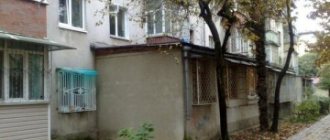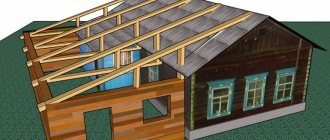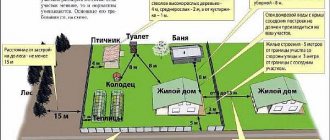Rarely do any homeowners think about how to legalize an extension to a private house. After all, most of them are accustomed to independently managing their property. Therefore, having decided to increase the area of a private house, the owners arm themselves with tools and begin to remodel the building at their discretion.
If a person was too lazy in advance or did not want to obtain permits for the work being carried out, an unauthorized extension is not considered legal. Accordingly, if a complaint is received from the owner of a neighboring plot, bailiffs will come to you demanding that the house be restored to its original condition. In this case, the age of construction does not play a role.
In addition, illegal construction entails a fine for the owner. Therefore, the extension needs to be legalized, and we will tell you how to do this.
What is an extension
Order of the Ministry of Land Construction of the Russian Federation dated 08/04/1998 N 37 (as amended on 09/04/2000) designates an extension as a part of a building located outside the contour of its main external walls.
It is auxiliary to the building and has one (or more) common main wall with it. As a rule, extensions have an internal connection with the main building. These include:
- attached kitchens;
- residential extensions;
- canopy;
- vestibules;
- verandas, etc.
It is important to understand that Russian legislation, namely: clause 14 of Article 1 of the Town Planning Code of the Russian Federation establishes that the reconstruction of capital construction projects is a change in the parameters of a capital construction project, its parts (height, number of floors, area, volume), including the superstructure , reconstruction, expansion of a capital construction project, as well as replacement and (or) restoration of load-bearing building structures of a capital construction project, with the exception of the replacement of individual elements of such structures with similar or other elements that improve the performance of such structures and (or) restoration of these elements.
Thus, the construction of an extension is a reconstruction of the building, due to the fact that it affects the load-bearing and/or enclosing structures of the building to which it is attached, increasing the area and/or height of the house.
Legal grounds
According to the norm of the 14th part of the 1st article of the Town Planning Code, the reconstruction of a private house can be recognized as:
- increasing or decreasing its total area (extension);
- increase in number of storeys (superstructure);
- complete replacement of load-bearing structures (reconstruction of walls, roof, etc.).
The addition may subsequently be legalized through the court , but this will only happen if the following conditions are met:
- no one's rights are violated by the reconstruction (neither neighbors nor the municipality);
- SNiPs and codes of regulations were not violated during reconstruction.
In this case, the judge must completely and completely believe you, otherwise the decision may not be in your favor. Or maybe a construction expertise will be required, which will result in financial losses: on average, expertise costs about 25 thousand rubles.
According to the rules of Article 51 of the same code, for reconstruction it is necessary to obtain permission from departmental authorities.
For reference. At the same time, under Article 222 of the Civil Code, houses reconstructed without permission may be recognized as illegal buildings and the extension may be required to be demolished. To avoid such incidents, you need to legally obtain a permit.
Fine for illegal extensions in 2021
If you erected an extension without permission without approval from the administration and without notifying Rosreestr about changes in the parameters of the house, then this fact will be considered a violation.
Such non-compliance with urban planning and administrative legislation entails certain consequences.
Citizens who carry out illegal additions to a private house bear administrative responsibility. Property owners for so-called unauthorized construction or reconstruction are liable in accordance with Article 9.5 of the Code of Administrative Offenses of the Russian Federation, as well as clause 2.222 of the Civil Code of the Russian Federation, which establishes that the violation must be eliminated by demolishing the unauthorized extension or returning the property to its original condition . The perpetrators will be required to carry out this work at their own expense.
Also in accordance with the Code of Administrative Offenses, paragraph 1. Article 9.5 of the Code of Administrative Offenses of the Russian Federation. Reconstruction of a residential building without obtaining permission from the authorities shall entail a fine in the amount of 2,000 to 5,000 rubles.
Stages of work to legitimize construction
Currently, the entire process of legitimizing an extension can be divided into three successive stages, each of which has its own specific work and features.
So, let's take a closer look at these stages:
Stage 1
Collection of the necessary package of documents, the list of which was presented above. It is worth noting that all work should begin after you have collected documents and certificates from the entire listed list; if you missed something, then your case will not be considered until the entire volume of necessary documents is submitted.
Stage 2
Submission of collected documents for consideration to judicial authorities. As a rule, the collected documents must also include a statement of claim written by you in your own hand for recognition of ownership of such a building. It is worth noting that the defendant in these types of cases is the district or city administration, with whose consent either construction is permitted or, on the contrary, prohibited.
The plaintiff is the owner of the property. Today, when considering cases, a judge may ask to see a permit in which all residents give their consent to the construction of this extension. Such permission must be legally correctly drawn up, executed and certified, but this is only at the discretion of the judge.
If the building was erected according to all the rules and in accordance with all requirements, then there is no need for such a permit. Once the building permit has been received, you can move on to the final stage.
Stage 3
Payment of all government fees. But, before you start paying, you first need to go to Rosregistration, where it is necessary to resolve the issue of registering a new building. It is there that a receipt for payment of the state duty is issued, after payment with which your structure is registered. It is worth noting that today the state duty is calculated on the basis of Article 33.21 of the Tax Code of the Russian Federation.
Only after going through all stages of the legalization process does your extension receive the status of a legalized type of housing.
Legalization of an extension to a house on SNT lands
If the house to which an extension is planned is located on the lands of gardening non-profit partnerships, then registration in 2020-2021 can be carried out in a simplified manner, without obtaining permission from local authorities. This option is possible for the period of the Dacha Amnesty-2, which is valid until March 1, 2021.
So, you turn to a specialist such as a cadastral engineer, who surveys the property and prepares a technical plan for the reconstruction of the house. Then all that remains is to submit the CD to the MFC, wait for Rosreestr’s response and no more difficulties.
It should be noted that during the “Dacha Amnesty-2”, an already constructed extension can be registered in a simplified manner.
So, if you have built or are planning to build an extension in the near future, then it is recommended to register it before March 1, 2021, so that in the future you do not encounter difficulties in the form of obtaining permits from the administration and other issues that complicate the registration of the extension.
The Supreme Court explained why unauthorized extensions cannot be legalized
In our case, the owner of a two-room apartment in the regional center increased it by 15 square meters. The woman carried out redevelopment inside the apartment and erected several more extensions, but from the street. Then she asked the local authorities to approve such an expansion of living space.
But she did not find mutual understanding with local administration officials on this issue and was forced to go to court to legalize such housing - “improved and supplemented.”
The district court listened to the parties to the dispute and met our heroine halfway. He allowed the plaintiff to legalize the updated and significantly enlarged apartment. According to the court, the apartment, expanded with several extensions, met engineering and fire safety requirements, and the resident’s neighbors and the chairman of the HOA did not object to the changes in writing. Then the city administration appealed this decision. Unsuccessfully. As a result, the administration reached the Supreme Court of the Russian Federation, and it heard its arguments, considering it correct and completely legal. Well, the Judicial Collegium for Civil Cases of the Supreme Court of the Russian Federation explained what exactly their colleagues in the lower authorities had overlooked.
This is the main idea expressed by the most experienced judges in the country. It sounds like this. An unauthorized balcony or loggia cannot be legalized according to the rules that apply to the reconstruction and redevelopment of housing, the Supreme Court emphasized.
And as an important argument, he recalled that back in 2014, the Presidium of the Supreme Court, in a review of practice in cases of unauthorized construction, explained to colleagues from lower courts how important it is to distinguish unauthorized constructions from less radical transformations.
The Supreme Court recalled that seven years ago it explained to colleagues how important it is to distinguish unauthorized buildings from less radical transformations
But this explanation, as it turned out, was not remembered by everyone. To this day, some courts in the country continue to make similar mistakes, which the Supreme Court has to correct months or even years later.
The legal aspects of housing disposal are discussed by RG experts in the “Legal Consultation” section
This happened in the case of a resident of Krasnodar, who decided to legalize changes in her apartment.
The owner of the apartment dismantled some of the partitions and built others instead, moved the heating radiators and, in addition, made several extensions - “utility rooms” to her apartment.
The result of such transformations was as follows: the owner managed to increase the total area of the housing from 48.9 square meters. m up to 63.8 sq. m.
The Krasnodar administration did not appreciate this “construction” achievement and refused to recognize the apartment in its modified form. Then the landlady asked the court to force the officials to approve her new housing. And she succeeded.
The first to consider the claim was the Sovetsky District Court of Krasnodar. He took into account the conclusions of a local company and the department of supervisory activities of Krasnodar - their experts confirmed that the reconstructed housing is safe for living and meets existing engineering and fire safety requirements.
The neighbors of the owner, judging by the case materials, also did not object to the changes. In any case, the plaintiff confirmed this with a letter from the chairman of the HOA and the minutes of the general meeting of residents. Expertise and the minutes of the meeting of apartment owners in the building convinced the court of the legality of the redevelopment and extensions.
The city administration was dissatisfied with this verdict and appealed the district court's decision. But they didn’t hear her there again. The Krasnodar Regional Court confirmed that the plaintiff fulfilled both conditions of the Housing Code of the Russian Federation in order to preserve the apartment in a new, remodeled form.
The owner of the apartment not only improved her home, but also changed the parameters of the entire house
According to the regional court, the owner of the “improved” apartment did not violate the rights of her neighbors and did not create a threat to their life and health. And this, as a mandatory condition, is stated in Article 29 of the Housing Code of the Russian Federation.
The Supreme Court of the Russian Federation did not agree with similar conclusions of its Krasnodar colleagues. He revised these conclusions of the local courts and corrected the Krasnodar judges. The Supreme Court stated the following.
According to the Judicial Collegium for Civil Cases of the Supreme Court, local courts confused two different concepts - redevelopment and unauthorized construction. In our case, the owner of a Krasnodar apartment not only improved her home, but also changed the parameters of the entire house when she built her own extensions to it.
The court emphasized that the enclosing structures of the Krasnodar high-rise building had changed.
The Supreme Court of the Russian Federation emphasized: the extensions were erected by the owner of the apartment without permission, because the plaintiff did not receive permission for their construction.
In this situation, local courts illegally legalized extensions, and did so according to the rules for legalizing redevelopment. Recognizing squatter construction is much more difficult. For example, its “author” must have the right to build this object, it must comply with the rules of land use and development, and so on.
All these clarifications will have to be taken into account by the Krasnodar Regional Court when considering the case again, since the Supreme Court overturned the previous decision.
In similar situations, experts always emphasize the difference between completely different concepts - redevelopment, redevelopment and reconstruction. And this is an important point to remember.
Thus, redevelopment changes the layout of the apartment without transferring communications, and reconstruction - with transferring communications. Reconstruction means new areas outside the old perimeter of the house.
According to experts, citizens who are planning redevelopment, reconstruction or reconstruction of their own housing should first coordinate the changes with administrative authorities. Nowadays, this important step is often skipped to save time and money, but poor quality work can cause accidents.
In similar situations, experts emphasize the difference between non-identical concepts - redevelopment, redevelopment and reconstruction
What happens in case of violation? If the owner nevertheless carried out the redevelopment of the apartment without permission, this threatens him with an administrative fine. Moreover, paying the fine will not relieve the owner of the need to legalize all changes made or return the apartment to its original form. If this is not done, such fines will be issued regularly.
But that's not the worst part. The administration, having issued several fines, has the right to go to court with a claim to deprive a citizen of his property rights, and local authorities can legally put his housing up for auction.
According to the Supreme Court of the Russian Federation, redevelopment and reconstruction of an apartment are two big differences. Photo: Oleg Prasolov
Registration of an extension to a house on individual housing construction lands
Legalizing an extension to a house on individual housing construction lands is somewhat more difficult. In this case, it is impossible to do without notification and approval of local authorities, namely:
- You must notify the administration that you are going to build an extension and obtain some kind of permission from it (Notice of Compliance). The notice period for consideration is 7 days.
- The next stage is when the cadastral engineer surveys the property and prepares a technical plan for reconstruction.
- Next, the Notification of Completion of Reconstruction and the Technical Plan are submitted to the administration for verification.
- And only after receiving a response from the administration, you have the right to submit a technical plan to the MFC for sending to Rosreestr (some administrations send the technical plan to Rosreestr independently. This point must be clarified directly with the local government authority).
- As a result, you will receive an Extract from the Unified State Register of Real Estate with updated data on the characteristics of the house.
It is important that the extension does not violate urban planning norms and rules.
How to arrange a non-permanent extension
There are no fundamental changes in the design of the house due to non-permanent extensions, they do not create a danger for the residents themselves, do not violate the standard distances and cannot in any way infringe on the rights of neighbors, therefore permission for their construction is not required. Actually, now it is not required at all, but since March 1 of this year, a notification has been introduced, which is submitted to local governments before the start of construction. But local authorities can both approve the construction and issue a refusal and, in fact, the meaning has not changed. If we are talking about non-permanent extensions, there is no need to submit a notification to the municipalities, but upon completion of construction they must be processed through the BTI.
- Provide title documents for the plot and house.
- Write an application for changes to the technical documentation.
Ideally, a commission will visit the site to verify the parameters of the extension; based on the results of the inspection, they will issue a certificate of completion of the reconstruction. You can register a non-permanent extension either immediately after construction or after a while; there are no fines or sanctions for delays. It is theoretically possible to leave it without registration at all, but it is impractical - it is not known how the legislation will change, it is better to have the entire package of documents on hand.











